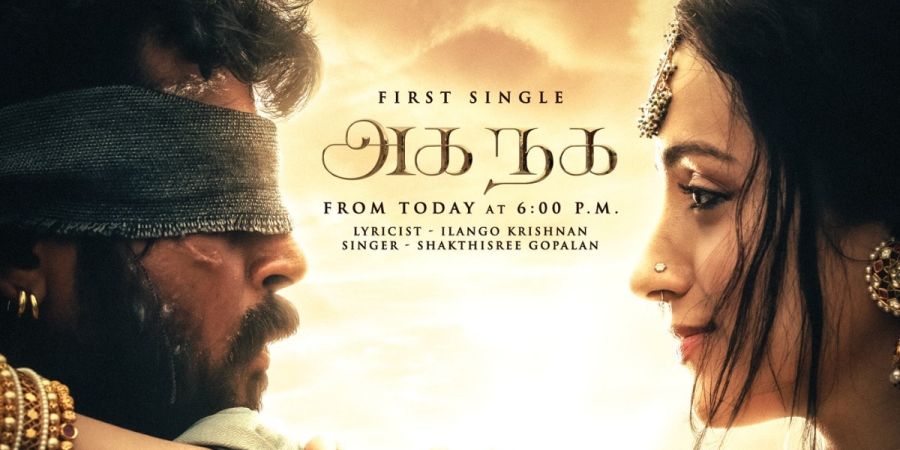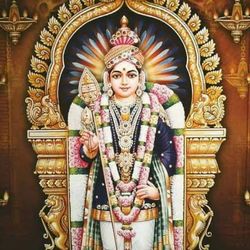

The little tempo increase in the extended track took some getting used to for me because I was used to the BGM version of Aga Naga from the first episode of Ponniyin Selvan. However, I am now completely smitten with this waltzy melody.The concise language adds to the charm as writer Ilango Krishnan does a good job of expressing princess Kundavai's love for her homeland, which exists in tandem with her affinities for Vanthiyadevan.Aazhi Mazhai Kanna is a poem by poet-saint Andal from her Perumal (Vishnu)-themed Thiruppaavai series, which compares Andal's devotion to Perumal to Vaanathi's feelings for the main character. The tune is finished in less than a minute and a half, which is a problem for several tracks from this album. The original composition is in the raga varaali, but A R Rahman here chooses a more pleasant melody (shades of desh raaga, I think?). However, it's wonderful to hear Harini, who hasn't performed for Rahman in a long time (there may have been other singers engaged; they go unacknowledged on Spotify), sing during that time. I was reminded of the charming bit songs from Kaadhalan by the song's bit nature and the female chorus.Another of the album's brief pieces is Shivoham, a Sanskrit composition by Shankaracharya (from his Nirvana Shatakam). Rahman transforms this into a dramatic piece akin to Shiva Thandava Stotram by ostensibly placing it to Chakravakam raaga. This song is delivered by a strong male chorus, and it is enhanced by the ideal chendamelam + edaykka combination for the intensity of the song.
The same two women, Keerthana Vaidyanathan and Niranjana Ramanan, who performed the lovely Paapam Seiyaathiru in Iravin Nizhal last year, are given a similar task in Ponniyin Selvan, a song that, due to its sparse arrangements, mainly depends on the singing. They excel at this song as well.
Kudavaiyil Ilaiyor Soodaar, a lament by Theerathanar, picks up where the first film left off—that is, with the purported passing of Ponniyin Selvan. Rahman choose a sinister stillness to embellish this composition and a suitably ominous raaga to convey the melancholy mood (my initial guess was between aahiri and thodi, but this thread suggests it may be a rarely used raaga phenadhyuthi). Strangely, the thought eventually turned to Game of Thrones' Sigur Ros cover of Rains of Castamere. For this song in Hindi, the composer intriguingly chooses a completely different melody—a lighter, more soulful (and slightly longer) tune—which is performed by the lovely-sounding Pooja Tiwary.The song Mukti Do, written by Gulzar, is a simple arrangement with only the odd sarangi passages standing out. However, I believe that I still prefer the Tamil melody. Ilango Krishnan bases the waltz-like metre of Chinnanjiru Nilave on the poems of Bharathiyar. (well, roopaka thaalam to use the Carnatic terminology). The song is also available in two different performances by Haricharan and Khatija Rahman, both of which are quite different in their presentation. However, they do share one feature: both versions feature increasingly turbulent arrangements (violins are the main contributors to this), perhaps in keeping with the puyal (storm) analogy mentioned in the first stanza. It is the Marumurai (Reprise?) that I truly appreciated, despite its archaic sound, despite Haricharan's great performance having a certain air of familiarity about it. The hypnotic impact of the piano refrain and Khatija's dreamy voice is pretty impressive. Veera Raaja Veera, my current favorite, is the last. Such a tune! Riffing off a traditional dhrupad piece in adana raaga (you can read more about the piece and hear the original piece on this thread), Rahman creates a classical flavoured piece mostly based on darbari kaanada raaga (or adana raaga, I cannot be sure), except for the little digression to a brief, seemingly hameer kalyani raaga based segment, around the midway mark.
The chorus is equally as excellent and effectively used in this song as the lead vocals, which shouldn't come as much of a surprise given the three artists leading the line: Shankar Mahadevan, K. S. Chithra, and Harini. One of my favourite parts of the song is the sitar-sarangi fight at the 2:08 mark. The orchestration heavily features Hindustani classical instruments, including the pakhawaj, sarangi, sitar, and others. Even though the arrangements have been significantly altered, the song's Hindustani flavour makes it a seamless fit in the Hindi version (sung by Arman Dehlvi, Shreya Ghoshal, and Kavita Krishnamurthy). A magnificent grand paean that ought to be the ideal accompanist for the dramatic crowning scene
I absolutely hope that we get to see the entire song onscreen!
Part 2 of Ponniyin Selvan. The only issue with this magnificent soundtrack by A R Rahman and Ilango Krishnan is its length. Although the first section also had a great selection of music, the sound was a little bit more "commercial". With this one, though, the composer fully embraced that vintage vibe and created a compilation of songs that were rich in classical music.


